- Welcome to Creator Forum - Racial Loyalty News Online.
• Shortened Link: W23.link » CreativityAlliance.com
• Beat the Censors on Social Media with ᵂ23 ᴰᴼᵀ ᴸᴵᴺᴷ
• Free Pontifex Maximus @P.M.JoeEsposito - Refused Parole Due to Creativity
• Free @Rev.JoelDufresne P.O.W. Prison Martyr - Bogus Charges
• Free @JamesCostello P.O.W. Imprisoned for Advertising Creativity
• Join the Church of Creativity - Limited Time: Free Membership
• Beat the Censors on Social Media with ᵂ23 ᴰᴼᵀ ᴸᴵᴺᴷ
• Free Pontifex Maximus @P.M.JoeEsposito - Refused Parole Due to Creativity
• Free @Rev.JoelDufresne P.O.W. Prison Martyr - Bogus Charges
• Free @JamesCostello P.O.W. Imprisoned for Advertising Creativity
• Join the Church of Creativity - Limited Time: Free Membership
-
 Wyoming: White Teen Murdered By Negroes, Death Blamed On "Culturally...
by Br.FrankSmith
Wyoming: White Teen Murdered By Negroes, Death Blamed On "Culturally...
by Br.FrankSmith
[Today at 9:42] -
 Tucker Carlson
by Rev.Cambeul
Tucker Carlson
by Rev.Cambeul
[Today at 2:17] -
 (((Ben Shapiro))) Disowned by His American Supporters
by Br.FrankSmith
(((Ben Shapiro))) Disowned by His American Supporters
by Br.FrankSmith
[Sun 14 Apr 2024] -
 School for Gifted Kids Closed Because It Contains Too Many White...
by Br.FrankSmith
School for Gifted Kids Closed Because It Contains Too Many White...
by Br.FrankSmith
[Sun 14 Apr 2024] -
 Scotland's Hate Crime Law Begins
by Rev.Cambeul
Scotland's Hate Crime Law Begins
by Rev.Cambeul
[Sat 13 Apr 2024] -
 A New Revisionist Site
by Br.FrankSmith
A New Revisionist Site
by Br.FrankSmith
[Sat 13 Apr 2024] -
 Australian Native Mud Crime
by Br.IanVonTurpie
Australian Native Mud Crime
by Br.IanVonTurpie
[Fri 12 Apr 2024]
Rev.Cambeul
2024-04-03, 05:06:35
Audio by Ben Klassen A.I.
Rev.Cambeul
2024-04-03, 04:31:45Rev.Cambeul
2024-03-06, 11:33:45CreatorGöth
2024-01-30, 22:01:22RaHoWa!!! Good to be back! 🤚🏻
Fortem
2024-01-11, 19:17:22Countries by IQ
See Africa
https://worldpopulationreview.com/country-rankings/average-iq-by-countrySee Africa
Rev.Cambeul
2023-12-09, 23:20:53Rev.Cambeul
2023-07-29, 02:08:13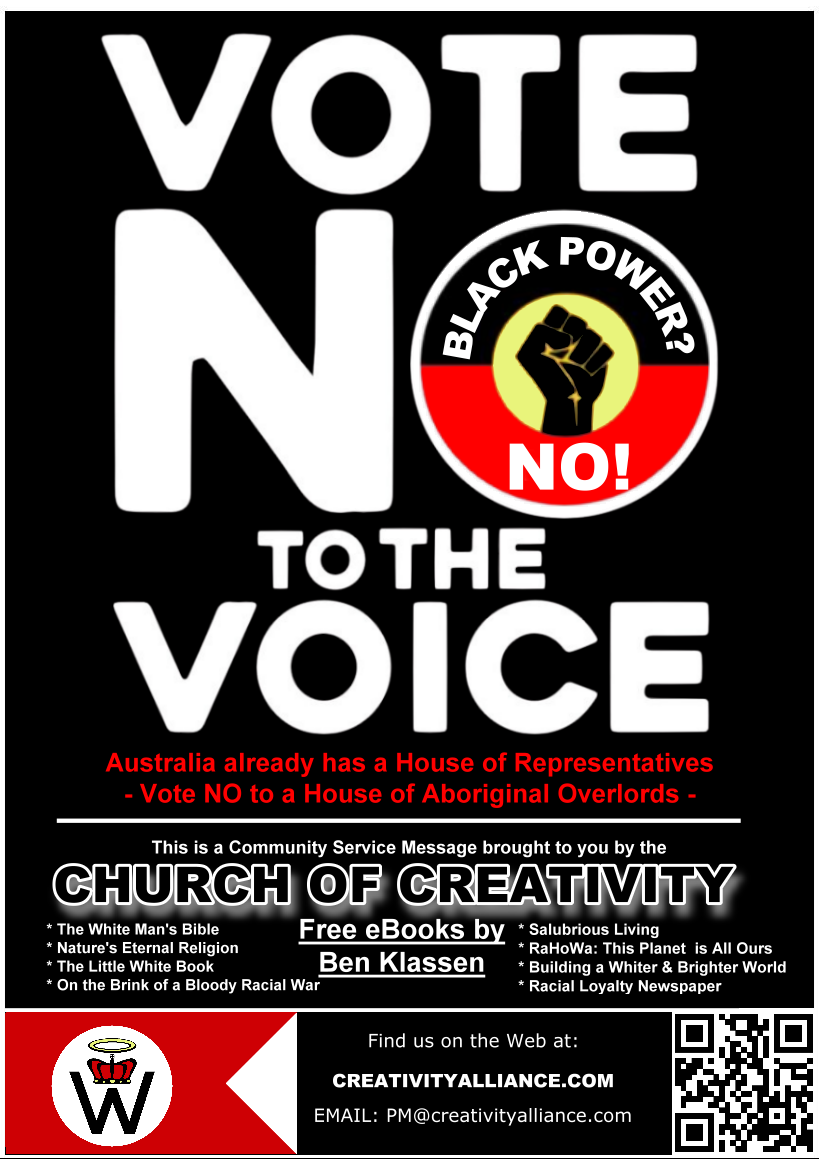 F.T.V!
F.T.V!Rev.Cambeul
2023-07-24, 01:07:37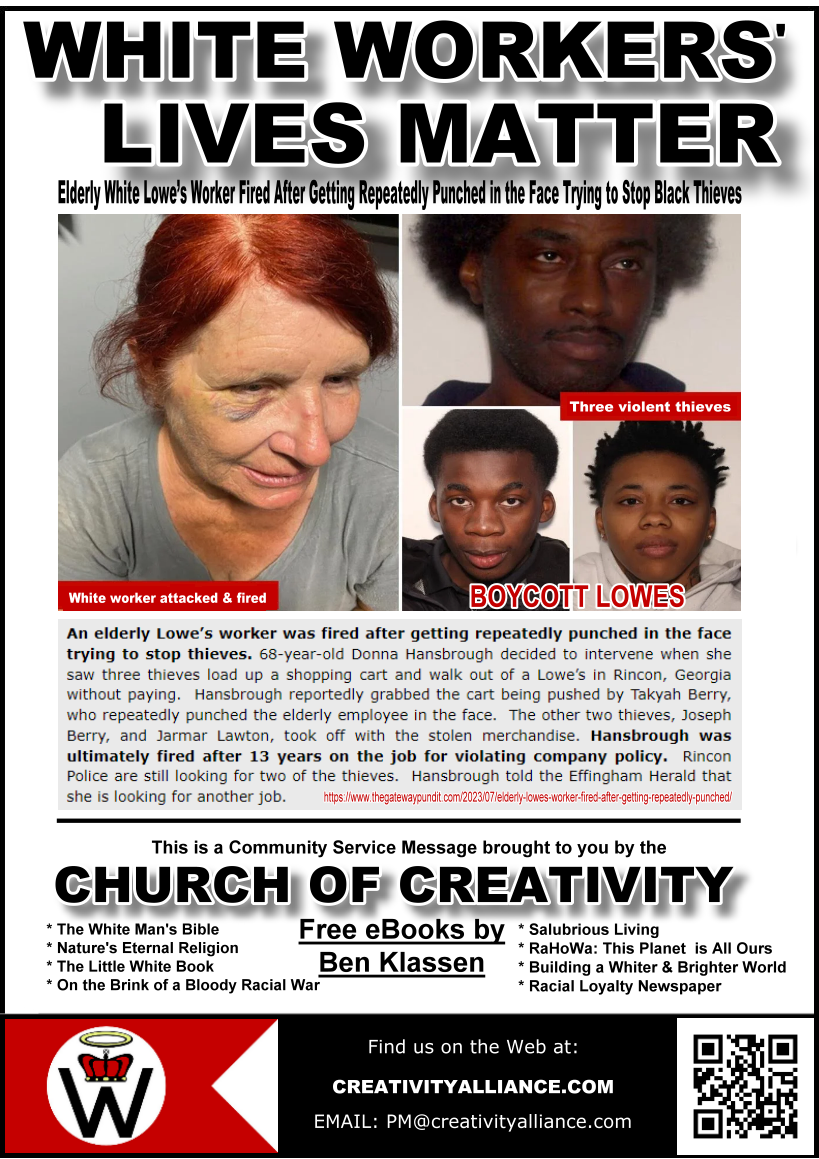 White Rights
Right Now!
White Rights
Right Now!* * *
Another Win!
She was Rehired
Rev.Cambeul
2023-07-06, 11:47:20Rev.Cambeul
2023-03-15, 11:53:21Rev.Cambeul
2023-03-01, 14:21:52CreatorGöth
2023-02-21, 15:17:30Are you reading NER? You should be. It's Founding Day.  RaHoWa!!! Hail Ben Klassen!!!
RaHoWa!!! Hail Ben Klassen!!!
 RaHoWa!!! Hail Ben Klassen!!!
RaHoWa!!! Hail Ben Klassen!!!Rev.Cambeul
2023-02-21, 15:01:39Haven't checked 'em out
https://www.goodreads.com/search?q=ben+klassen
https://www.goodreads.com/search?q=ben+klassen
CreatorGöth
2023-02-20, 18:48:0575 flyers out this month. This is the last week of February. Are you getting your flyers out? R!
Rev.Cambeul
2023-02-13, 14:38:06Put a flyer on or near a town sign. Take a pic & upload it to our Gallery.
Spread the Word of R!
Spread the Word of R!
CreatorGöth
2023-02-11, 05:32:3625 flyers a week is all it takes, my fellow Prospects. Show your dedication and march forth with pride. RaHoWa!!!
CreatorGöth
2023-02-01, 05:26:54Rev.Cambeul
2023-01-28, 23:22:16Art
2022-08-19, 22:07:58Call out the Jewish menace daily.
Rev.Cambeul
2022-05-20, 12:50:21Rev.Cambeul
2022-04-09, 04:48:40Rev.Cambeul
2022-03-10, 09:28:45Rev.Cambeul
2022-02-27, 01:49:13The Church of Creativity thanks Sister Kerry's generous donation to PM Joe. RaHoWa!
FelixRex
2022-02-21, 06:44:59Happy Holy Days! RaHoWa!
Rev.Cambeul
2022-02-21, 01:06:40Rev.Cambeul
2022-02-20, 09:59:17FelixRex
2022-02-12, 19:24:31Rev.Cambeul
2022-02-07, 05:53:00The Church of Creativity thanks Sister Kerry's generous donation to PM Joe. RaHoWa!
FelixRex
2022-01-20, 03:38:36Happy Ray Day!
Rev.Cambeul
2022-01-18, 02:34:01PM Joe just called and wishes everyone a
Happy
James Earl Ray Day

James Earl Ray Day

FelixRex
2022-01-16, 15:26:24Happy to help. 

Rev.Cambeul
2022-01-09, 05:14:12P.M. Joe thanks @Br.FelixRex for his latest donation. R! 

Rev.Cambeul
2022-01-01, 07:28:401/1
Today is the Seventh
& Final Day
of Festum Album
Creator Calendar Link
Festum Album PDF Link
Today is Purity Day
Today is the Seventh
& Final Day
of Festum Album
Creator Calendar Link
Festum Album PDF Link
Today is Purity Day
Rev.Cambeul
2021-12-31, 13:55:5031/12
Today is the Sixth Day
of Festum Album
Creator Calendar Link
Festum Album PDF Link
Today is Law Day
Today is the Sixth Day
of Festum Album
Creator Calendar Link
Festum Album PDF Link
Today is Law Day
Rev.Cambeul
2021-12-30, 06:25:4930/12
Today is the Fifth Day
of Festum Album
Creator Calendar Link
Festum Album PDF Link
Today is Memorial Day
Today is the Fifth Day
of Festum Album
Creator Calendar Link
Festum Album PDF Link
Today is Memorial Day
Rev.Cambeul
2021-12-29, 09:37:3029/12
Today is the Fourth Day
of Festum Album
& West Victory Day
Creator Calendar Link
Festum Album PDF Link
Today is Ingenuity Day
Today is the Fourth Day
of Festum Album
& West Victory Day
Creator Calendar Link
Festum Album PDF Link
Today is Ingenuity Day
Rev.Cambeul
2021-12-28, 03:24:5428/12
Today is the Third Day
of Festum Album
Creator Calendar Link
Festum Album PDF Link
Today is Unity Day
Today is the Third Day
of Festum Album
Creator Calendar Link
Festum Album PDF Link
Today is Unity Day
FelixRex
2021-12-27, 21:12:59We need more nigger free holidays! Happy Festum Album 

Rev.Cambeul
2021-12-27, 02:21:4527/12
Today is the Second Day
of Festum Album
Creator Calendar Link
Festum Album PDF Link
Today is Destiny Day
Today is the Second Day
of Festum Album
Creator Calendar Link
Festum Album PDF Link
Today is Destiny Day
Rev.Cambeul
2021-12-26, 04:10:0026/12
Today is the First Day
of Festum Album
Creator Calendar Link
Festum Album PDF Link
Today is History Day
Today is the First Day
of Festum Album
Creator Calendar Link
Festum Album PDF Link
Today is History Day
FelixRex
2021-11-12, 17:00:09Rev.Cambeul
2021-10-16, 02:25:32Notice from PM Joe: The Zionist Swine are now rejecting mail with "Rahowa" included in it. Advises to use alt-:
R! 18! 23/23 31/23 W23
R! 18! 23/23 31/23 W23
Rev.Cambeul
2021-10-07, 12:33:10Check out our new Shortened Web LinkIt also works for all @creativityalliance.com email addresses.
N567
2021-09-28, 15:02:24I agree with you Rev Cambeul. Fags must be killed using pneumatic cattle stunners and thrown into the trash compactors of garbage trucks before being thrown into the furnaces of waste-to-electricity power plants to be used as fuel for electric power generation and the production of ash fertilizer and fly ash concrete strengthener. RaHoWa! White Power!
N567
2021-09-28, 15:00:09It is great news to know that high testosterone badass Rev Joe Esposito is being released in 2023. He is a great asset to the White Power Movement! RaHoWa! White Power!
Rev.Cambeul
2021-09-07, 09:10:12Kiddy fuckers are the worst kind of Faggotry. Gassing is too good for them. They need to be crucified.
Rev.Cambeul
2021-07-31, 07:34:02FelixRex
2021-07-30, 06:37:18R! Rev. Joe free in 23!
Rev.Cambeul
2021-07-29, 13:18:16P.M. Joe sends @Br.FelixRex his thanks for his latest donation. RaHoWa!
User actions





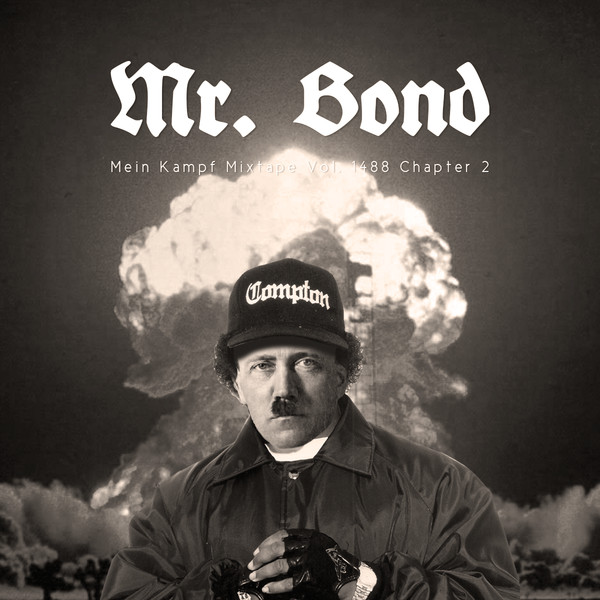
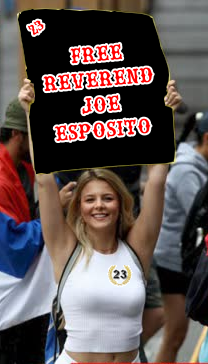
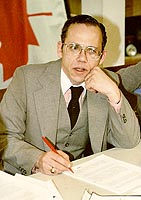

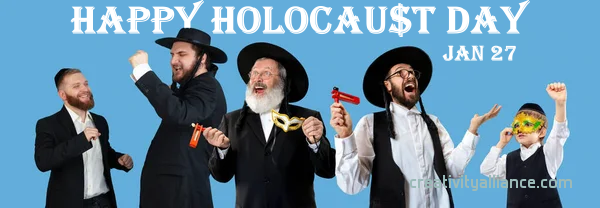
 Download Now
And Share the Message
Download Now
And Share the Message
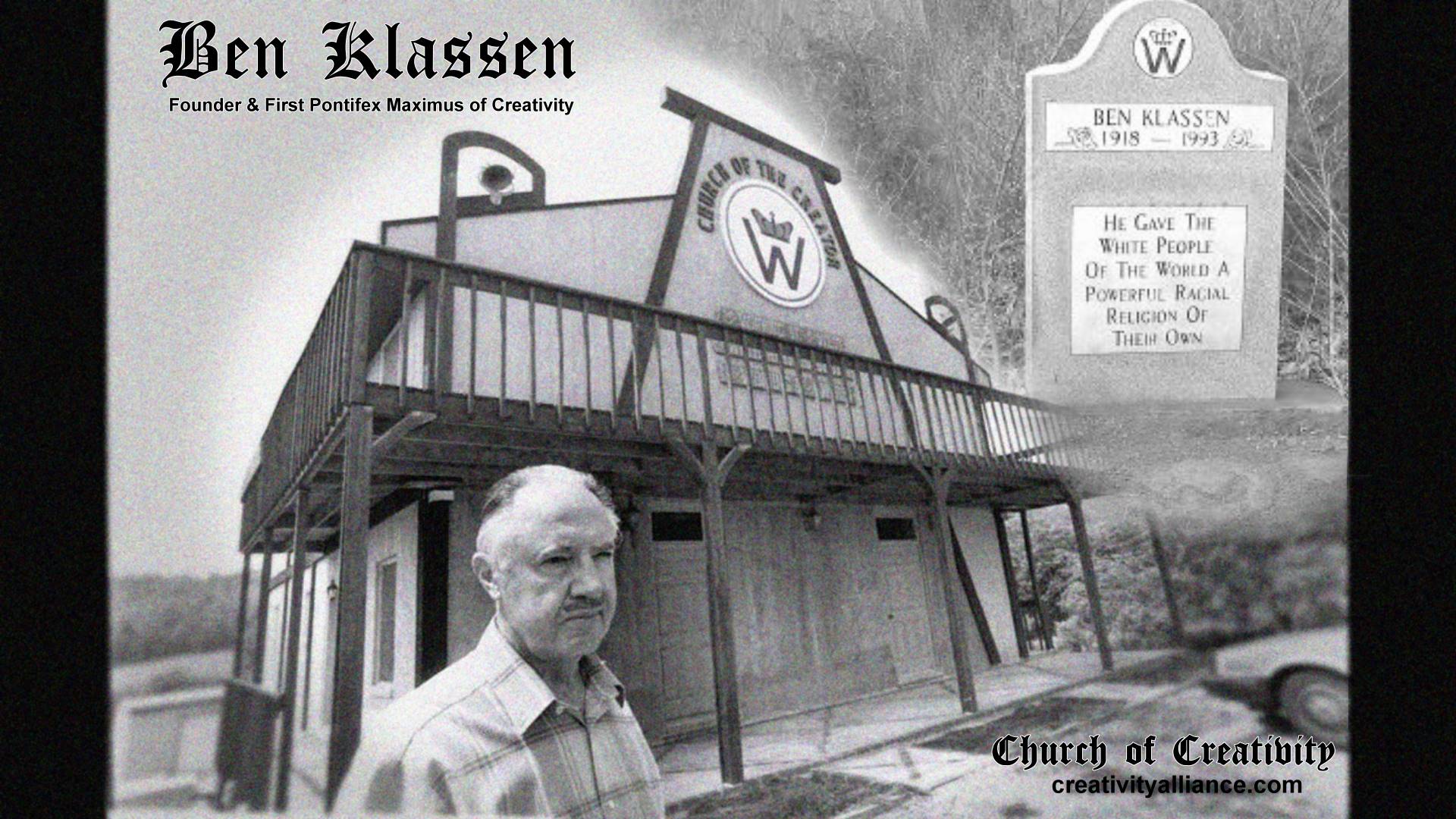 Forum Link
Forum Link
